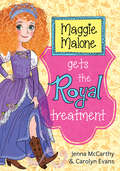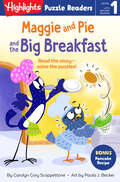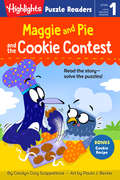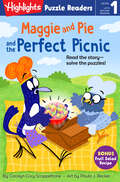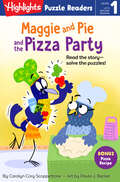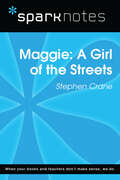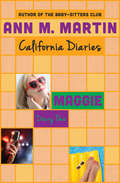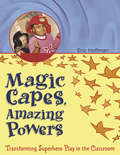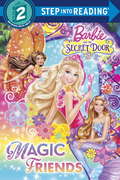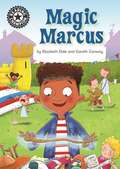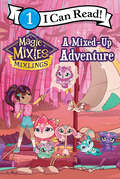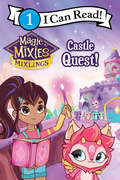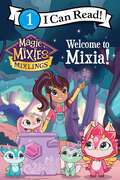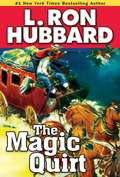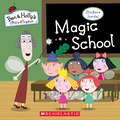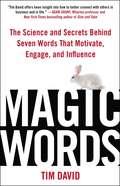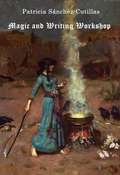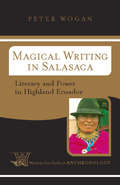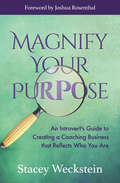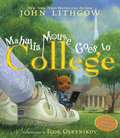- Table View
- List View
Maggie Malone Gets the Royal Treatment
by Carolyn Evans Jenna MccarthyWalking a mile in someone else's shoes can be a royal pain Everyday is Freaky Friday for Maggie Malone and her Mostly Magical Boots. Whenever she slips on the MMBs, Maggie gets to be whomever she wants for a whole day. And whose life could be more fun to try on than the glamorous Princess Wilhelmina of Wincastle's? Even better, Wilhelmina is a bridesmaid in the Royal Wedding of the Century! But even pampered princesses have whopper-sized problems-and hers is an evil archenemy named Penelope. Will she survive Penelope's tricks or will the whole wedding turn into a royal disaster?
Maggie and Pie and the Big Breakfast (Highlights Puzzle Readers)
by Carolyn Cory ScoppettoneHighlights Puzzle Readers offer an innovative approach to learning that integrates puzzles and stories to develop motivated, confident readers. These Level 1 books are perfect for kids who are reading simple sight words and sounding out decodable text.Fans of Amelia Bedelia will love these bird buddies! Maggie, a scatter-brained magpie, and Pie, a rule-following pigeon, love to cook together, but sometimes Maggie gets a little mixed up! In this Level 1 Highlights Puzzle Reader, kids solve visual logic puzzles to help find the right ingredients. With a bonus recipe so kids can make their own applesauce pancakes, Maggie and Pie and the Big Breakfast is perfect for beginning readers.
Maggie and Pie and the Cookie Contest (Highlights Puzzle Readers)
by Carolyn Cory ScoppettoneHighlights Puzzle Readers offer an innovative approach to learning that integrates puzzles and stories to develop motivated, confident readers. These Level 1 books are perfect for kids who are reading simple sight words and sounding out decodable text.Maggie and Pie are bird buddies that love to cook—but sometimes Maggie gets a little mixed up! As they bake cookies in this Level 1 Highlights Puzzle Reader, kids can use clues in the story to find the supplies they need in simple visual puzzles that double as picture support for the text. With a bonus recipe, Maggie and Pie and the Cookie Contest will appeal to junior chefs who are just discovering reading.
Maggie and Pie and the Perfect Picnic (Highlights Puzzle Readers)
by Carolyn Cory ScoppettoneHighlights Puzzle Readers offer an innovative approach to learning that integrates puzzles and stories to develop motivated, confident readers. These Level 1 books are perfect for kids who are reading simple sight words and sounding out decodable text.Maggie and Pie are bird buddies that love to cook—but sometimes Maggie gets a little mixed up! As they make fruit salad, in this Level 1 Highlights Puzzle Reader, kids can use clues in the story to find the supplies they need in simple visual puzzles that double as picture support for the text. With a bonus recipe, Maggie and Pie and the Perfect Picnic will appeal to junior chefs who are just discovering reading.
Maggie and Pie and the Pizza Party (Highlights Puzzle Readers)
by Carolyn Cory ScoppettoneHighlights Puzzle Readers offer an innovative approach to learning that integrates puzzles and stories to develop motivated, confident readers. These Level 1 books are perfect for kids who are reading simple sight words and sounding out decodable text.Fans of Amelia Bedelia will love these bird buddies! Maggie, a scatter-brained magpie, and Pie, a rule-following pigeon, love to cook together, but sometimes Maggie gets a little mixed up! In this Level 1 Highlights Puzzle Reader, kids solve visual logic puzzles to help find the right ingredients. With a bonus recipe so kids can make their own pizza, Maggie and Pie and the Pizza Party is perfect for beginning readers.
Maggie: A Girl of the Streets (SparkNotes Literature Guide Series)
by SparkNotesMaggie: A Girl of the Streets (SparkNotes Literature Guide) by Stephen Crane Making the reading experience fun! Created by Harvard students for students everywhere, SparkNotes is a new breed of study guide: smarter, better, faster. Geared to what today's students need to know, SparkNotes provides: *Chapter-by-chapter analysis *Explanations of key themes, motifs, and symbols *A review quiz and essay topicsLively and accessible, these guides are perfect for late-night studying and writing papers
Maggie: Dawn, Sunny, Maggie, Amalia, And Ducky (California Diaries #3)
by Ann M. MartinMaggie makes everything she does look easy--but there's a high price to pay for perfectionMaggie Blume does everything right. She gets straight A's, is a talented pianist, and was just named the youngest poetry editor of the school's literary magazine, Inner Vistas. She makes the life of a successful thirteen-year-old look easy.For Maggie's father, nothing but perfect will do. Not only is he obsessed with his job as a studio executive, he expects Maggie to have a detailed plan for her life, which unfortunately leaves no room for her true passion: music.Once Maggie's friends learn of her talent, they help her land a spot as the lead singer for Vanish, the band managed by her friend Amalia. Maggie could never share this news with her dad, so when she has to choose between going to his movie opening and the battle of the bands, she takes a huge risk to make sure she's able to do it all--perfectly.This ebook features an illustrated personal history of Ann M. Martin, including rare images from the author's collection.
Magic Capes, Amazing Powers
by Eric HoffmanHeroes, villains and saving the day! Magic Capes, Amazing Powers explores why children are so strongly attracted to superhero and weapons play, and addresses the resulting concerns of parents and teachers. Unique in its approach to this wildly popular type of play, Magic Capes describes how teachers can use redirection, story-telling, dramatic play materials, anti-bias curriculum and clear limit-setting to guide superhero play in a positive direction that allows children to play and satisfies the concerns of adults.Eric Hoffman is the program coordinator for the Cabrillo College Children's Center in Aptos, CA. He has worked with preschool-age children since 1970 and cofounded the CRADLE Project, which assists teachers and parents who do conflict resolution with children.
Magic Friends (Barbie and the Secret Door)
by Chelsea EberlyGirls ages 4 to 6 will love learning to read on their own with this Step 2 Step into Reading leveled reader based on Barbie's latest film, releasing in fall 2014.
Magic Licking Lollipops: Targeting the l Sound (Speech Bubbles 2)
by Melissa PalmerLynn and Lily love licking lollipops, and lollies of all colours, shapes and sizes. But this time, have they bitten off more than they can chew? This picture book targets the /l/ sound and is part of Speech Bubbles 2, a series of picture books that target specific speech sounds within the story. The series can be used for children receiving speech therapy, for children who have a speech sound delay/disorder, or simply as an activity for children’s speech sound development and/or phonological awareness. They are ideal for use by parents, teachers or caregivers. Bright pictures and a fun story create an engaging activity perfect for sound awareness. Picture books are sold individually, or in a pack. There are currently two packs available – Speech Bubbles 1 and Speech Bubbles 2. Please see further titles in the series for stories targeting other speech sounds.
Magic Marcus: Independent Reading 12 (Reading Champion #256)
by Elizabeth DaleMarcus comes across a magic wand at a jumble sale, but he doesn't believe it has any magic in it. Soon after he starts making wishes and they each to come true, until he breaks his mum's favourite vase. Perhaps Marcus has discovered that real magic doesn't lie in the wand, after all.Reading Champion offers independent reading books for children to practise and reinforce their developing reading skills.Fantastic, original stories are accompanied by engaging artwork and a reading activity. Each book has been carefully graded so that it can be matched to a child's reading ability, encouraging reading for pleasure.The Key Stage 2 Reading Champion Books are suggested for use as follows:Independent Reading 11: start of Year 3 or age 7+Independent Reading 12: end of Year 3 or age 7+Independent Reading 13: start of Year 4 or age 8+Independent Reading 14: end of Year 4 or age 8+Independent Reading 15: start of Year 5 or age 9+Independent Reading 16: end of Year 5 or age 9+Independent Reading 17: start of Year 6 or age 10+Independent Reading 18: end of Year 6 or age 10+
Magic Mixies: A Mixed-Up Adventure (I Can Read Level 1)
by Mickey DomeniciBased on the bestselling toy and all-new animated YouTube series, Sienna and her enchanting friends find themselves in a real magical mix-up!After a bumpy start to their adventure, Sienna and her friends arrive in the beautiful seaside town of Enchanters Edge. As they set up camp for the night, the group decide to have an impromptu talent show. But when Luggle becomes sick, haywire magic causes major havoc. Stay tuned until the end, because this adorable early reader even includes a fun search-and-find at the end of the story!This book is a Level One I Can Read, perfect for children learning to sound out words and sentences. Whether shared at home or in a classroom, the short sentences, familiar words, and simple concepts of Level One books support success for children eager to start reading on their own.Get ready to make real magic and discover the world of Magic Mixies Mixlings, a spellbinding new Collectible from Magic Mixies! Join Sienna in all her adventures as she encounters a whole new realm FILLED with magic creatures. Magicus Mixus!
Magic Mixies: Castle Quest! (I Can Read Level 1)
by Mickey DomeniciBased on the bestselling toy and all-new animated YouTube series, Sienna and her Mixies friends arrive at an enchanted Castle!When they arrive at the enchanted Castle, Sienna and her friends discover that things aren’t always as they appear. Turns out getting Sienna home is going to be harder than they thought. Stay tuned until the end, because this adorable early reader even includes a fun search-and-find at the end of the story!This book is a Level One I Can Read, perfect for children learning to sound out words and sentences. Whether shared at home or in a classroom, the short sentences, familiar words, and simple concepts of Level One books support success for children eager to start reading on their own.Get ready to make real magic and discover the world of Magic Mixies Mixlings, a spellbinding new Collectible from Magic Mixies! Join Sienna in all her adventures as she encounters a whole new realm FILLED with magic creatures. Magicus Mixus!
Magic Mixies: Welcome to Mixia! (I Can Read Level 1)
by Mickey DomeniciBased on the bestselling toy and all-new animated YouTube series, enter the magical world of Mixia and meet a whole new crew of Mixie and Mixling friends! Follow Sienna on her magical journey through the world of Mixia as she is joined by new friends like Carrot, Luggle, Parlo, and more. Stay tuned until the end, because this adorable early reader even includes a fun search-and-find at the end of the story!This book is a Level One I Can Read, perfect for children learning to sound out words and sentences. Whether shared at home or in a classroom, the short sentences, familiar words, and simple concepts of Level One books support success for children eager to start reading on their own.Get ready to make real magic and discover the world of Magic Mixies Mixlings, a spellbinding new Collectible from Magic Mixies! Join Sienna in all her adventures as she encounters a whole new realm FILLED with magic creatures. Magicus Mixus!
Magic Quirt, The
by L. Ron HubbardWelcome to the wild, wild west. Old Laramie, cook for the cowpunchers at the Lazy G Ranch, happens to be in the right place at the right time to stop bandits from attacking a Spanish-speaking family with Aztec roots. The family offers Laramie a silver-mounted quirt as thanks, telling him the small horsewhip will make him a big man.Though he'd never really thought of himself as anything other than old, Laramie accepts the idea that the mysterious quirt holds special Aztec magic; in fact, he thinks, with the quirt in his hands, he's now invincible. To prove this claim, Laramie sets out on a series of adventures showing that the quirt has given him extraordinary newfound bravery and skill--or has it? ALSO INCLUDES THE WESTERN STORIES "VENGEANCE IS MINE!" AND "STACKED BULLETS""...is pure entertainment from first page to last with that L. Ron Hubbard touch giving this tale an enduring reading engagement from beginning to end."--Midwest Book Review
Magic School ( Ben & Holly's Little Kingdom)
by Eone<P>Princess Holly the fairy is sent to Mrs. Fig's Magic School, and she invites her friends to come along! The Wise Old Elf is convinced that magic always leads to trouble -- and it turns out he might be right . . . <P>Ben and Holly live in the Little Kingdom, a tiny land where flowers and grass rise above even the tallest towers. Holly is a young fairy princess who is still learning to fly and control her magic -- which sometimes gets her in some sticky situations! Her best friend, Ben the elf, doesn't have magical powers, but he's great at making toys and always ready for adventure. This story with stickers is based on the Nick Jr. TV show, from the creators of Peppa Pig.
Magic School Bus: Ocean Adventure (Scholastic Reader, Level 2)
by Mary Kay CarsonNow early readers can take a ride on the Magic School Bus!With the help of Ms. Frizzle, young readers can develop their reading skills while they pick up fun facts about the world's ocean. Ms. Frizzle's class will teach you everything you ever wanted to know about the deep sea through this engaging and accesible reader. This is a great introduction to the Magic School Bus program.
Magic Words
by Tim DavidYears of experience as a magician taught Tim David that real magic is all about words, and the way they influence the minds of the audience. What sets a professional magician apart from an amateur are people skills like communication, influence, and engagement--skills that are also effective in the workplace. By applying seven "magic" words in a business setting, David offers tools for effective and persuasive communication. You will learn: The secret word that Harvard psychologists discovered is the key to unlocking human motivation How one very special word (spoken only inside your mind) mysteriously has a profound positive impact on those around you The number one mistake that managers make during 1-on-1's, and the one simple word that can fix it all What Dale Carnegie dubs "the sweetest sound in any language" How one tiny word can instantly change someone's mind for the better The single word that an in-depth study of thousands of hours of call center recordings revealed as the quickest way to reduce differences and calm people down How the infamous "But Eraser" works and why so many people mess it up The REAL magic behind the word "thanks" The seven words: Magic Word #1 - Because Magic Word #2 - "Name" Magic Word #3 - If Magic Word #4 - But Magic Word #5 - Absolutely Magic Word #6 - Thanks Magic Word #7 - Help
Magic and Writing Workshop
by Patricia Sánchez-CutillasThis is a book about creative writing that relates literature with magic The magical moments of the day, the energy of the Moon goddesses and the Sun gods, the eternal return, the magical dates, even atmospheric phenomena, are elements that you can use to write, to create stories or to make them stronger. This book will teach you how to do this and it is dedicated to lovers of culture and to those of you who like magic in life and literature. And at the end of each theme there are writing suggestions that you can put into practice what you have learnt.
Magical Characters: Christopher Hart's Draw Manga Now! (Christopher Hart's Draw Manga Now!)
by Christopher HartMagical Characters teaches readers how to draw in the whimsical and imaginative style of manga that has given rise to such fan favorites such as Sailor Moon and Naruto. Including lessons on fantastical clothing, characters types and their magical powers, and even magical beasts, this book covers everything readers need to go from manga fans to fantasy manga artists. After an introduction to these elements, readers will have a chance to follow along Hart's in-depth step-by-steps, and will even be invited to draw on their own, right in the book's pages.
Magical Writing in Salasaca: Literacy and Power in Highland Ecuador
by Peter WoganExplores the connections between beliefs about writing and power in an indigenous village in highland Ecuador.
Magnets
by Wiley BlevinsPhonics Readers is a recognized leader in helping you teach phonics and phonemic awareness, within the context of content-area reading. Content area focus: Magnets; Phonics Skills: final e, l-blends
Magnificent Sam: The Amazing Adventures Of Sam Houston
by Laurie Cockerell Travis Dougherty"Magnificent Sam" is a children's picture book detailing the exciting life and amazing adventures of Sam Houston. Beautiful full-color illustrations accompany the text, as the reader is introduced to one of Texas' - and America's - greatest heroes. The book concludes with a glossary, timeline, discussion questions and additional resource section. Gold Medal: Will Rogers Medallion Award - Western Non-Fiction, Young Readers; Finalist: Western Writers of America Spur Award - Best Western Juvenile Nonfiction; Finalist: Writers' League of Texas Book Awards - Children's Picture Book
Magnify Your Purpose: An Introvert's Guide to Creating a Coaching Business that Reflects Who You Are
by Stacey WecksteinDo what you love and you&’ll never work a day in your life—and with the help of this inspiring self-help guide, you can do just that! What&’s holding you back from doing what you love? Do you want to create a business that reflects who you are? And stop feeling guilty about what others think you &“should&” do with your life? In Magnify Your Purpose, creative business coach Stacey Weckstein, founder of Radiant Mind and Body LLC, will help you find your inner voice and the confidence to bring your authentic self out into the world. She will help you navigate around the pitfalls where too many creative professionals and new coaches get stuck trying to fit into traditional ways of doing business. Best of all, she will teach you―as she has taught herself and many others―how to turn your passions into a purposeful career. Join Stacey on the journey of reconnecting with yourself and manifesting your dreams.
Mahalia Mouse Goes to College
by John LithgowMahalia Mouse and her family live underneath Dunster House, an old Harvard dormitory. Foraging for food for her younger brothers and sisters, Mahalia gets trapped in a backpack and then finds herself inside a classroom far from home. Mahalia, intrigued by the lecture, starts attending classes and soon becomes a full-time student -- all the while wondering about the fate of her family. But when graduation day finally arrives, Mahalia has a wonderful surprise waiting for her. Written as part of his keynote address at Harvard's commencement, this latest book from John Lithgow (class of '67) incorporates his trademark witty rhymes and includes a CD of him reading the text at the commencement. Mahalia's story has an inspiring message for graduates or anyone whose success is worthy of celebration.
